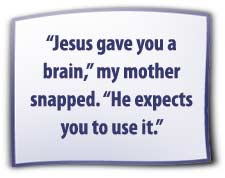 ould you like some ice cream?” the woman asked. She stood across from my sister and me.
Sonja was 7 and I was 4; we were very fond of ice cream. We lived in Uganda, where our parents were missionaries. Food there was scarce; ice cream an impossibility. We were visiting the United States on furlough when the woman presented us with this temptation.
ould you like some ice cream?” the woman asked. She stood across from my sister and me.
Sonja was 7 and I was 4; we were very fond of ice cream. We lived in Uganda, where our parents were missionaries. Food there was scarce; ice cream an impossibility. We were visiting the United States on furlough when the woman presented us with this temptation.
Sonja and I had spent the day shopping with our mother. She was purchasing clothing for the next three years: years of climbing trees, riding cows, and growing taller. It was a long day, and the last few hours had been difficult. There was sighing, certainly, and the same question again and again: Are we almost done?
“I'm going to visit one more shop,” Mother finally told us. “You stay here with the bags.”
Mother placed her purchases on a bench and disappeared into a Sears department store. I was crawling on the floor—pretending, perhaps, to be a dog, when the woman approached. I remember scrambling up and sitting beside my sister.
The woman opened with the offer of ice cream, holding out a dollar and gesturing toward a far shop.
 “No thank you,” Sonja said. “We aren’t supposed to take money from strangers.”
“No thank you,” Sonja said. “We aren’t supposed to take money from strangers.”
“That’s wise,” the woman said. She seemed to talk only to Sonja, one adult to another. “You know, your sister has a dirty face,” she said, as if it were something she’d just noticed. “You should take her to the bathroom and wash it.”
Sonja looked at me, and my face was dirty. Sonja nodded to the woman, licked her index finger, and rubbed the dirt from my cheek. I squirmed unhappily. It was bad enough when our mother did it.
“Your mother has been gone a long time,” the woman said.
This was true.
“I bet she left you,” the woman said. “She’s probably already at home.”
Our mother would never leave us. We both believed this. And yet, she had been gone a long time. A mall was a strange and clinical place, and it seemed that anything could happen here. Maybe Mother was lost.
“Stay here,” Sonja said. “I’ll go find Mommy.”
“Now your sister’s gone too,” the woman said, turning to me. “I guess you’re all alone. What are you going to do now?”
She had a pretty good idea, and indeed, it didn’t take much coaxing for me to abandon the bags and scurry into the department store.
I had barely entered when I ran into my mother and sister. “Where are the clothes?” my mother asked. Not waiting for an answer, she sprinted toward the now empty bench. There was no woman, no shopping bags.
“No, no, no!” my mother said.
After visiting the mall’s security desk, we took the bus to my uncle’s home. It was a long, gloomy ride. My mother gazed out the window and cried. How were we going to get through the next three years?
“Don’t worry, Mommy,” I said. “We’ll pray to Jesus, and He’ll bring back the bags.”
“Jesus gave you a brain,” my mother snapped. “He expects you to use it.”
Undeterred, Sonja and I knelt on the metal floor of the bus and took turns praying.
When we arrived at my uncle’s house, we learned that the police had just called. The woman had tried to exchange the items at the store, and now all our bags were waiting for us.
Looking back, I feel great empathy for my mother. Of course she was devastated. But mostly, I’m amazed at my younger self. When I learned the clothing had been found,
\I wasn’t even surprised.
As an adult, I tend to be cerebral. I believe in asking questions. I still do. But having faith means moving beyond the known. It means trusting totally in the divine. Children are good at faith. They greet the world wide-eyed and optimistic. Only later do they learn cynicism.
This New Year I want to be more hopeful and childlike.* I want to spend more time praying. I want to go outside more. I want to look at leaves, really look at them, and at insects, too. I want to read more poetry. I want to have a richer, deeper faith.
________
*Which I think is different from being childish.
_____________
Sari Fordham is an assistant professor in the English and Communication Department at La Sierra University in Riverside, California.

 ould you like some ice cream?” the woman asked. She stood across from my sister and me.
Sonja was 7 and I was 4; we were very fond of ice cream. We lived in Uganda, where our parents were missionaries. Food there was scarce; ice cream an impossibility. We were visiting the United States on furlough when the woman presented us with this temptation.
ould you like some ice cream?” the woman asked. She stood across from my sister and me.
Sonja was 7 and I was 4; we were very fond of ice cream. We lived in Uganda, where our parents were missionaries. Food there was scarce; ice cream an impossibility. We were visiting the United States on furlough when the woman presented us with this temptation. “No thank you,” Sonja said. “We aren’t supposed to take money from strangers.”
“No thank you,” Sonja said. “We aren’t supposed to take money from strangers.”